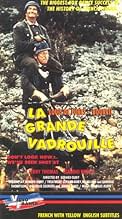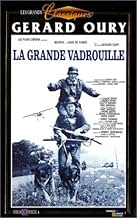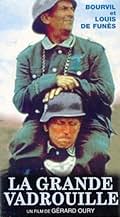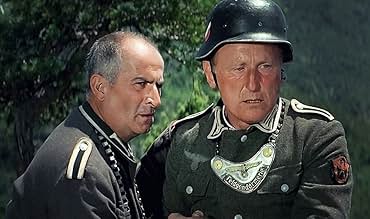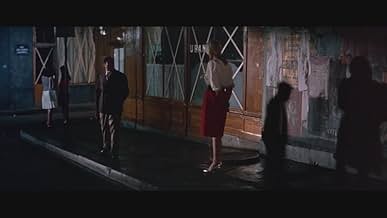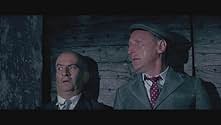Augustin et Stanislas viennent en aide, malgré eux, à des pilotes anglais abattus au dessus de Paris. Étant eux même compromis par la présence des aviateurs, ils s'enfuient à leurs côtés ver... Tout lireAugustin et Stanislas viennent en aide, malgré eux, à des pilotes anglais abattus au dessus de Paris. Étant eux même compromis par la présence des aviateurs, ils s'enfuient à leurs côtés vers la zone libre.Augustin et Stanislas viennent en aide, malgré eux, à des pilotes anglais abattus au dessus de Paris. Étant eux même compromis par la présence des aviateurs, ils s'enfuient à leurs côtés vers la zone libre.
- Réalisation
- Scénario
- Casting principal
- Récompenses
- 2 victoires au total
- L'officier allemand dans le train
- (as Helmut Schneider)
- Un bassonniste
- (as Grosso)
Avis à la une
A perennial favourite on French TV during the Christmas or Easter holidays it is one of those rare movies you can watch over and over again without getting tired of it. It runs more than two hours but moves along at an incredible pace. Movie relies bigtime on the clash of character between de Funes as the self-important musical director of the Opéra de Paris and Bourvil as the simple housepainter. But also the hilarious script, some spectacular setpieces (including a spielbergesque chase by German sidecars) and a surprising finale all add up to making `Vadrouille' one of the best and most entertaining French movies ever.
Made on a lavish budget by Gerard Oury who would go on to make some other highly succesfull comedies, mostly starring big French stars as de Funes and Bourvil, but also Jean-Paul Belmondo, Pierre Richard and Christian Clavier. Incidentally his next venture was to be the equally succesfull `The Brain', starring none other than David Niven (!) and Eli Wallach, backed up by Bourvil and Belmondo. Bourvil and de Funes should be reunited again by Oury in `La folie des Grandeurs' but then sadly Bourvil passed away. He was replaced by none other than Yves Montand.
Up to that time movies made in France took war rather seriously, but `La grande vadrouille' sparked of an endless string of farces set in WWII which almost invariably depicted the French as very clever and cunning, always outwitting the Germans in the end. Even the recent (2002) `Laissez-Passer' from much-acclaimed director Bertrand Tavernier is based on this premiss.
If you like this definitely try to see `Le Corniaud', the first de Funes/Bourvil caper by Oury or why not `Mais ou est donc passé la 7ieme compagnie ?' as a prime example of the smart French vs not-so-smart German theme.
All of this is a backdrop to a wonderful comedy. It could be compared with Mel Brooks' "To be or not to be", and I believe it comes out the superior of the two. Easily the best Louis de Funes movie ever - and so, perhaps, also the best French comedy ever...
The film received the funny but rather hokey sounding English title "Don't Look Now, We're being shot at", but actually "La Grande Vadrouille" simply means something like "The Big Stroll" or "The Giant Walk". As you can derive from the above paragraph, the film takes place in during the WWII Nazi occupation of France. The story already starts out hilariously, when the pilot of a British bomber plane asks his fellow passengers what their location is. They claim the plain is more or less above Calais, but when the clouds clear up they are surprised to see the Eiffel Tower directly beneath them. The plane is shot down by German ground troops and each of the three British soldiers wanders off towards a different part of Paris with their parachutes. The British pilots receive help from two typical yet entirely opposite French citizens, namely the simple but hard- working painter Augustin Bouvet and the snobbish orchestra leader Stanislas Lefort. Both men, along with the help of various other French citizens, take several risks in order to reunite the British team, which of course makes them enemies of the Third Reich as well. The whole group has to flee towards the South of France, but naturally the journey is full of obstacles and dangers. Many, and I do mean MANY, sequences in "La Grande Vadrouille" have become immortal cinematic highlights over the years and it's almost impossible to list them. The mix-up with the room numbers in the hotel, for example, is very famous and still as incredibly funny by today's standards as it must have been back in 1966. Other unforgettable highlights include the rendezvous in the Turkish bath house and the pumpkin counterattack. In fact, every single interaction between the legendary French actors/comedians Bourvil and Louis de Funès qualifies as classic comedy cinema. Both geniuses where at the absolute heights of their careers at this point, but Bourvil sadly passed away far too young a couple of years later, at age 53. Louis de Funès continued to make several more French comedy classics until his death in the early 1980s, including the sequels in the successful "Les Gendarmes de Saint-Tropez" franchise, "Les Aventures de Rabbi Jacob" and "La Soupe aux Choux". De Funès truly was, without any exaggeration, one of the funniest people who ever lived. His looks and his energetic facial expressions were his main trademarks. He wasn't very tall and his almost naturally cantankerous apparition, in combination with his distinct voice and habit of talking really fast, made him the ideal hothead-character. "La Grande Vadrouille" is a brilliant film, with a brilliant cast and a brilliant director, as well as brilliant music (courtesy of Georges Auric) and brilliant cinematography by Claude Renoir. It's warmly recommended to all admirers of genuinely funny comedies and fundamental viewing for everyone living in Europe.
Le saviez-vous
- AnecdotesThis movie was seen by 17 million people in France, a box-office record in that country until Titanic (1997).
- GaffesAt the very beginning, we see an aerial shot of Paris; however we can clearly see modern buildings built in the 60s.
- Citations
Augustin Bouvet: [with strong French accent] You, you come with me to pick up Peter.
Stanislas LeFort: No, you you come with me to pick up MacIntosh!
Augustin Bouvet: No no no no, you you you! and if you don't come I... oh merde alors comment on dit ça...
Stanislas LeFort: Comment ça "merde alors"? but alors you are French!
- Versions alternativesThe original German release had several parts of the French original cut. Some of them might have been taken out because some gags could not be used because of the different languages used in the original (French, German and English). There is for example the quite funny scene when Claudio Brook reveals himself as an English man on the train when he says "I'm sorry" when spilling some vine. The German version instead just shows the angry German officer who commands to arrest the English soldier. Some parts are cut without any obvious reason - e.g. a humorous dialogue of Louis de Funès and Bourvil, their escape and chase in German uniforms. The German version just comes into the scene when they are already arrested.
- ConnexionsFeatured in Il fait des Bond: Les meilleures cascades de Rémy Julienne (1998)
Meilleurs choix
- How long is Don't Look Now... We're Being Shot At!?Alimenté par Alexa
Détails
- Date de sortie
- Pays d’origine
- Langues
- Aussi connu sous le nom de
- Don't Look Now... We're Being Shot At!
- Lieux de tournage
- Sociétés de production
- Voir plus de crédits d'entreprise sur IMDbPro
Box-office
- Budget
- 15 000 000 F (estimé)
- Durée2 heures 3 minutes
- Rapport de forme
- 2.39 : 1
Contribuer à cette page




